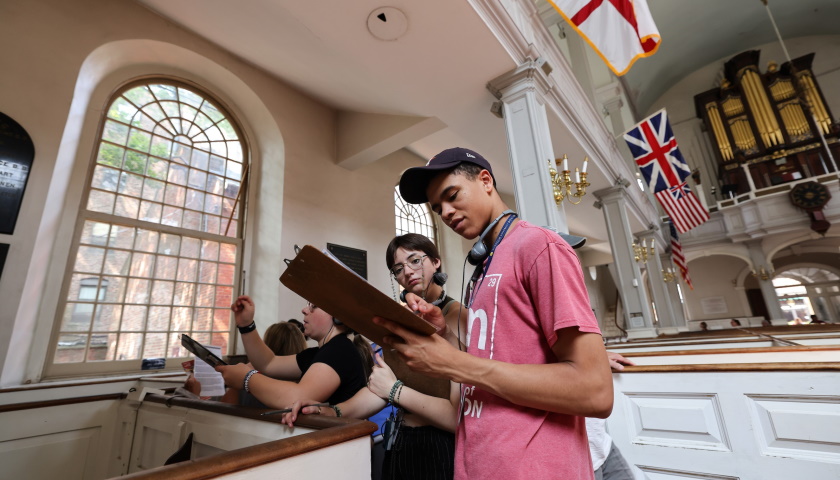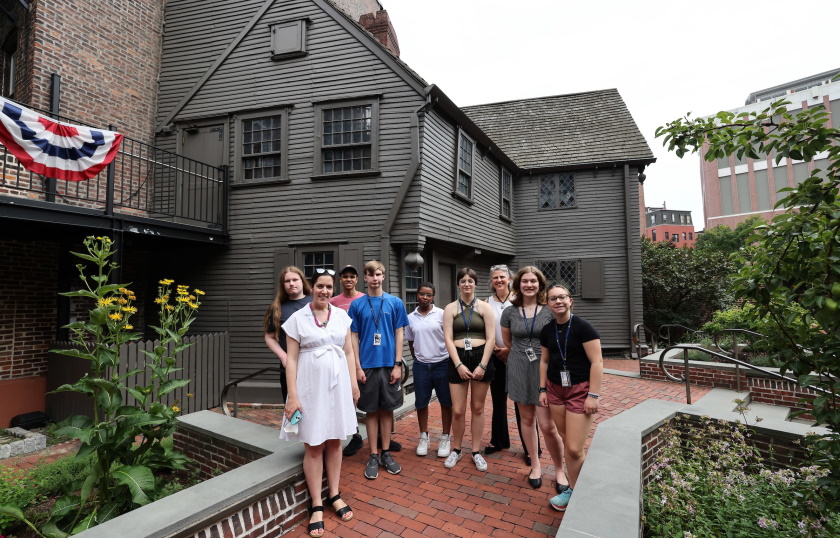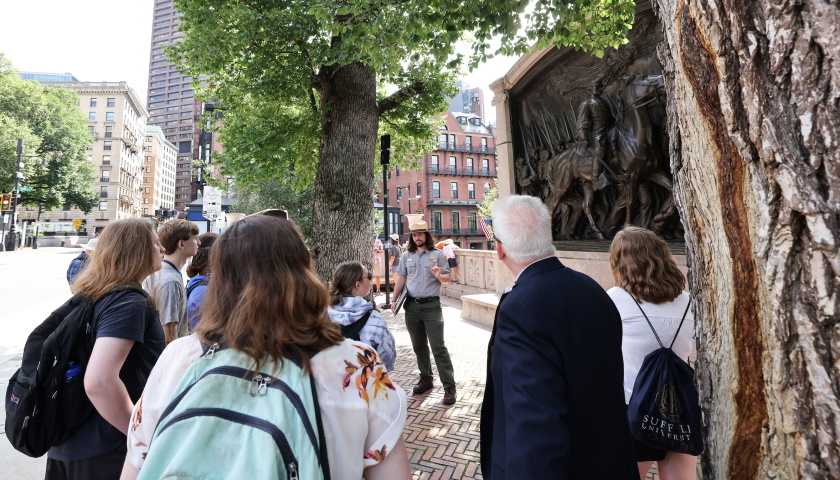Public History for a New Generation

On a steamy July morning, Maeve Donovan sat in the balcony of Boston’s Old North Church. The pews were cramped and the air close and heavy, but the Lynnfield High School junior didn’t mind: From where she was sitting, she had a clear, unobstructed view of Boston’s colonial past.
Close to the church’s altar, she could see the roomy private boxes where members of the wealthy merchant class would have worshipped. At the rear of the church, she could see the steep staircase that led to the balcony where she now sat—and where, in the years leading up to the American Revolution, the church’s free and enslaved Black members and congregants were relegated.
As she climbed back down the twisting stairs, Donovan reflected on how the trappings of status, wealth, and racial privilege followed colonial Bostonians everywhere. “You get a real sense of their experience from knowing their stories and their names,” she said. “You feel like you can connect with the past.”

Wrestling with big questions
What does it mean to be an active citizen? How is American identity continually shifting and changing? How did ideas of liberty and freedom differ in meaning for enslaved and free people during and after the Revolution? How do the stories we tell about a place and its people help us understand the nation’s more complicated, but powerful, narratives?
Wrestling with big questions may not be the typical way teenagers spend their summer vacation, but Boston-area high schoolers like Donovan who enrolled in the inaugural Suffolk University Summer Public History Institute were more than ready for the challenge.
The two-week program for rising high school sophomores, juniors, and seniors was designed to provide budding social historians with a deep dive into the rich history of Boston’s colonial, Revolutionary, and modern eras.
The institute, said Edie Sparks, dean of the College of Arts & Sciences, is part of a new effort to build the visibility and reputation of the college through summer programming that draws new audiences, including high school students, to campus for learning opportunities that take advantage of the areas in which Suffolk has special strengths and can offer a distinctive experience.
Created and led by Professor Kathryn Lasdow, an authority on the early history of the American republic and leader of Suffolk’s Public History Program, the course featured daily field trips to Boston’s many Revolutionary War and Black history monuments located steps from Suffolk’s campus. Day trips to Salem, Lexington, Concord, and the John F. Kennedy Presidential Library and Museum on Columbia Point were interspersed with lectures, tours, and spirited discussions between students and Suffolk alumni working in the field as historians and educators about the nature of public history—the study and practice of how history is presented in nonacademic settings.
“It’s always wonderful to watch kids who were the only ones in their class interested in history suddenly surrounded by other kids interested in history,” said History Professor Robert Allison, a noted local history expert and author of several books. With Boston as a classroom, the summer course “is not just a lot of dates and names. It becomes lived experience for students, and they really come to understand how the Revolution and Constitution are fundamentally about power, and how to form a government.”
For Peter Olmeda of Winchester, the program was a sort-of time machine that helped humanize the stories of real people, especially those who spent centuries marginalized and ignored by traditional public history practices.
“When we went to the Old South Meeting House, for example, you were standing right where someone you learned about stood. That’s really exciting,” said Olmeda, a rising senior at Stanford Online High School.
The group traveled by foot from campus to the North End of Boston for their private tour of the Old North Church—from which, many say, the American Revolution was “launched from the steeple.”
The students gained fresh insights into the evening of April 18, 1775, including the close shave of Robert Newman and John Pulling, the two lantern hangers who were part of a secret band of conspirators protecting munitions stores in Concord from advancing British troops. They were able to briefly display the “one if by land, two if by sea” beacons before British troops began banging down the door of the church.
The men escaped through a church window to avoid capture, as the gears of the American Revolution were set in motion.

Interacting with history
The Summer Public History Institute was inspired by a similar immersive course Lasdow took as a high schooler one summer at the College of William & Mary in Williamsburg, Virginia.
“That experience was transformative,” she says. “It led to me becoming a historian. I wanted to capture a little bit of that program here at Suffolk.”
After lunch, the group walked to the nearby Paul Revere House a few cobblestoned blocks away from the church. There, they chatted with Executive Director Nina Zannieri and considered how much the teaching of history has changed, even in their lifetimes, from stuffy, word-heavy, static exhibits, to more interactive opportunities to see the many layers, even contradictions, in a particular artifact or event.
Ruthanna Kern, a rising senior at Somerville High School and self-proclaimed “history nerd,” has traced her lineage back to the sister of Betsy Ross, the woman credited with sewing the first American flag in 1776. She was interested in the institute from the moment she heard Suffolk would be offering it. “I love history and feel lucky to live in Boston,” she said.
The movement toward inclusion in public history is gratifying to Kern. Earlier this year, she earned a gold medal at the Massachusetts Regional Showcase for National History Day Competition for her one-woman spoken-word performance piece, “Broken: The Treaties of Fort Laramie and the Myth of the Frontier,” which gave voice to Indigenous peoples involved in the negotiations between Native tribes and the US Government in 1868.
“I like that the places we are seeing are being more comprehensive about all perspectives, instead of just calling something ‘untold stories,’” Kern said.
For their final projects, students created digital historical exhibits using Meta Quest, a cutting-edge virtual reality tool. Art & Design Professor Sean Solley gave the students a crash-course in programs such as SketchUp and Spatial to create their digital projects.
It is exciting, Lasdow said, to expose students to these tools so early in their development as historians. “We are finding that digital literacy is becoming more and more important to employment in public history for our majors.”
Next summer, said Sparks, the institute will be offered as a residential program from July 7-19, with plans to recruit students from all over the country and even internationally.
“It is wonderful that Suffolk is a place where young people interested in history ‘find their people,’” Lasdow said. “They are seeing that history is something you can study and pursue for the rest of your life, not just as a hobby, but as a career.”
As seen in the Fall 2023 edition of Suffolk University Magazine
Explore history at Suffolk
Contact
Greg Gatlin
Office of Public Affairs
617-573-8428
Erica Noonan
Office of Public Affairs
774-286-9528



